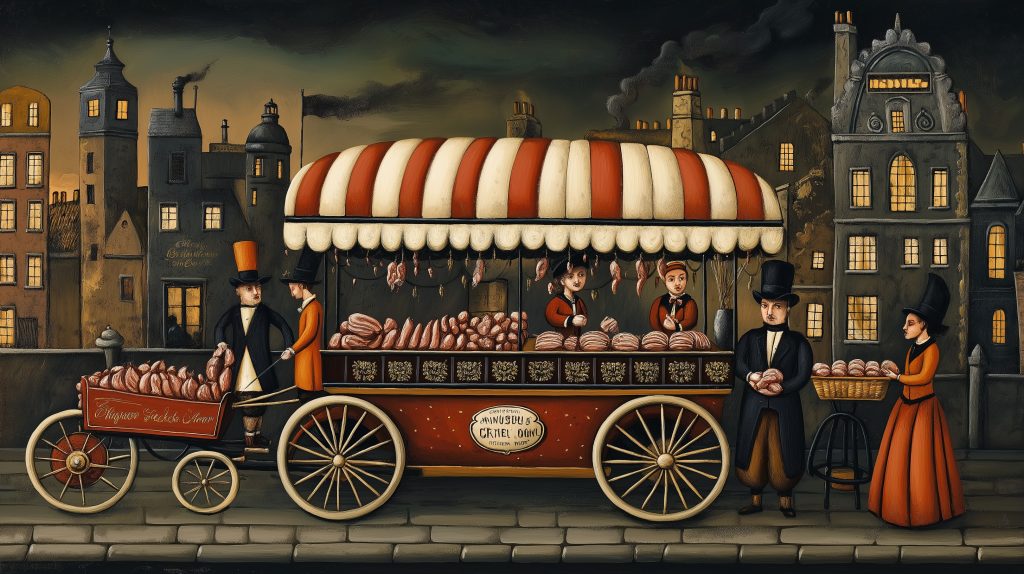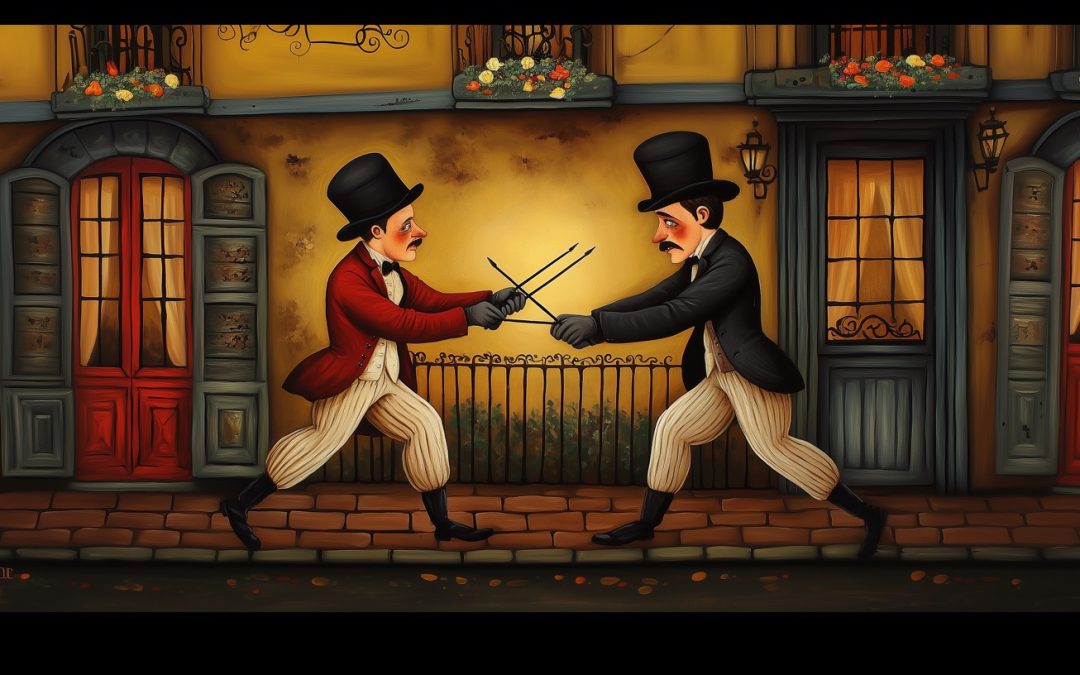In the Trample District, the Sittens and the Peletti families settle a decades-old kebab feud through deadly means, with customers unaware of the stakes.
The sounds are those of sizzling meats and jolly banter. Visitors to Guardian City’s showpiece Trample District spill out of the region’s theatres into another arena of drama. The smells, the calls, the bargains, the temptation of a free sample, juggling the red-hot cube of meat hand to hand.
To most, it would appear nothing more than the bustle of a highly competitive street food scene. The district’s main thoroughfare, Cordell’s Alley, which runs from Millstone Lane to the Theatre Roundabout, is now lined with rival kebab carts. On any given evening, one can see a growing number of skewers twirling over open flames. But few know that behind the tempting aroma of seasoned lamb and grilled vegetables lies a violent and increasingly codified dispute.
But beneath the surface of this district’s kebab carts, a shadowy, centuries-old feud between two families has erupted into something far bloodier.
A long-lived kebab rivalry
Two families dominate the kebab trade. The Sittens and the Pelitti families. They have done for decades. Their rivalry built on their choice of the finest meats, sauces, the colour of their stalls and their language. They have fought out a war for your guineas with your taste buds as the battlefield.
The battle lines were clear cut. The Sittens had The Cut. The Pelettis, the Petticoat Chafe. The Trample District was out of bounds because of the stricter licensing arrangements.
All that has changed. The licences have gone, the free-for-all has begun. Now the rancour has grown so great that both families, as well as eyeing the prize, are staging incursions into each other’s turf.
These are the kebab wars.
A simmering dispute
It’s unclear exactly when the first skirmish occurred, but a scuffle broke out in the shadow of the grand Trample Theatre one evening in mid-November, when a Sitten cart found itself positioned too close to a Peletti cart. A customer bought from one but paid the other by mistake.
A fist fight broke out. Then another, then another.

The city’s market inspectors became involved and threatened to impose further sanctions, killing both their businesses. In a rare show of discretion, the families sat down and agreed to keep their scuffles private. They would store up the resentments of a working day then play them out in codified duels, after dark and out of sight.
Skewers at midnight.
So far, there has been one death, four hospitalisations and numerous petty piercings.
Plenty at stake
The fatalist was Edwin, the Sitten hair, a quiet but brutal man of 38. He had challenged Thomas Peletti, patriarch of the other family, to a formal duel on December 3. He slipped on the ice, cracked his head on the kerb and was dead in an instant, only fuelling the hunger for retribution.
Again, codes now dictate that there cannot be a fatal strike. An eye, perhaps, a lost ear. A finger or two is missing from the complement. But nothing more.
- Commodore and his bizarre beach blunder spark diplomatic crisis
- Food review – inside the spider cafe that’s making everyone squirm
- The egg and spoon showdown that shook Guardian City
They wear their finest aprons – each family’s a different shade of green – and face off in front of their respective carts, under the gaze of their fellow vendors. The duelists circle, moving in sharp, precise steps. As each contest begins, the combatants deliver what is called the salute – a short, ritualistic sprinkle of salt into the air, before the real fighting begins.
While the Skewer Duel is ostensibly about physical dominance, it has evolved into an intricate exchange of tactics, strategy, and reputation. These duels have evolved. They are not merely brutal encounters, they are becoming increasingly formalised. It is more like a test of choreography. Independent judges are drafted in to assess style and grace.
A sporting endeavour
Despite its bloody purpose, there is now a remarkable civility to the entire process. The families have discussed turning the event into a sport and have already started charging onlookers for good viewing positions.
And yet, for all the precision, the stakes are high. A single loss means relinquishing control of the area. Honours are even at present and a temporary truce holds. Meanwhile, further behind the scenes, promising young nephews and cousins have been given time off to practice their duelling skills.
None of the customers can have the slightest inkling of the simmering tensions at play. When they queue up for Stitten skewered kebab or a Peletti hot special, when they cheer the joshing rivalry of neighbouring carts, little can they imagine the blood that has been spilled into gutters.
In a district known for its theatre and spectacle, the Kebab War hides its sting. It remains an unseen conflict, played out with knives and skewers, a curious and brutal extension of culinary tradition.
The cost of your post-theatre kebab has soared. And it is not paid in coins.

